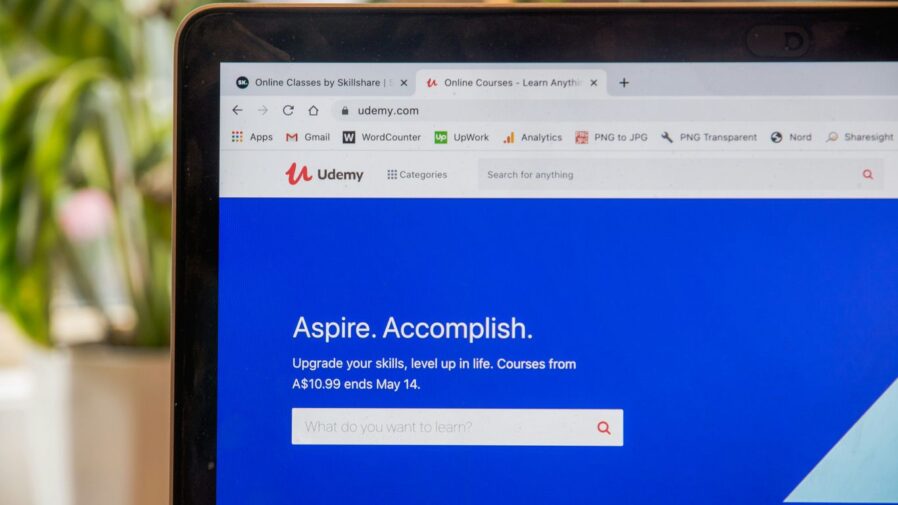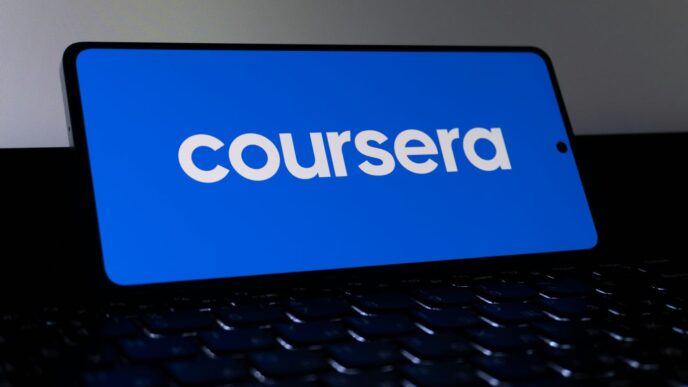Online learning has really changed how we get new information. It’s opened up chances for people to grow professionally. The training platforms out there now are better than ever. If you want to get better at your job, hit career goals, or just try something new, online courses are a good way to go. They let you learn when it works for you, offer tons of info, and give you practical skills. By 2025, the best training platforms will have great resources, including free stuff and even degree programs. If you’re not sure where to start, this guide will show you the top online training platforms for learners today.
Key Takeaways
- Check out the best online learning platforms for different needs and jobs in 2025.
- These platforms were picked for their great course content, covering tech, creative work, and business.
- Find free learning materials like those from Khan Academy and affordable university courses on Coursera.
- Learn from experts with videos and hands-on stuff on MasterClass.
- Look into courses that give you certificates to help with your career.
1. Coursera

Coursera is a pretty big name in online learning, and for good reason. It partners with actual universities, like Stanford and Yale, to bring their courses to you. This means you can often take classes that feel like real college courses, with lectures, readings, and assignments. What really sets Coursera apart is that many of these university courses are available to audit for free. You get all the learning materials, but without the graded assignments or direct instructor feedback. If you want a certificate or a degree, though, you’ll need to pay for that.
It’s a solid choice if you’re looking for academic rigor and don’t mind a bit of self-direction. You can learn anything from computer science to history, often at your own pace. They also have professional certificates and even full degree programs if you’re looking to make a career change or get a formal qualification.
Here’s a quick look at what you can expect:
- University-level courses: Access to materials from top universities worldwide.
- Flexible learning: Audit courses for free or pay for certificates and degrees.
- Wide subject range: From arts and humanities to business and tech.
- Professional development: Certificates and degrees designed for career advancement.
2. Thinkific
Thinkific is a really solid choice if you’re looking to build and sell your own online courses or other digital stuff, like ebooks or memberships. It’s pretty straightforward to use, even if you’re not super tech-savvy. You can pick a pre-made design and then tweak it with a drag-and-drop editor, so you don’t need to know any coding.
What really sets Thinkific apart is that you have full ownership of your content. Unlike some other sites where you’re just a user, here you’re the boss of your own creations. This means you control everything from the course material to how you market it.
Here are some of the standout features:
- White-label mobile app: You can even have your own branded app for students to use on their phones.
- Blended learning support: It works well if you want to mix online content with in-person activities.
- AI-powered course landing pages: Helps make your course pages look good and attract students.
Thinkific offers a free trial so you can get started right away. After that, paid plans begin at $36 per month, which unlocks more tools for tracking student progress and making sales. For students, the price of courses varies because each creator sets their own prices. You can often find free courses on there too, which is great for exploring new topics without spending money.
3. LinkedIn Learning
LinkedIn Learning, which used to be Lynda.com, is a solid choice if you’re looking to boost your professional skills. They’ve got a ton of video courses covering business, tech, and creative stuff, all taught by people who actually work in those fields. Think leadership, marketing, coding, design – you name it.
One of the cool things is how it ties into your LinkedIn profile. Completing courses lets you add certificates right to your profile, which can really help when you’re trying to show off what you know to potential employers or just keep your professional image up to date. It’s a pretty straightforward way to build up your resume.
Here’s a quick look at what they offer:
- Business Skills: Courses on management, sales, marketing, and finance.
- Technology Skills: Training in software like Excel and Tableau, plus programming and IT.
- Creative Skills: Lessons in graphic design, video editing, and web development.
They also have some neat features like personalized learning plans and AI-powered coaching to help guide your learning journey. If you’re already a LinkedIn Premium subscriber, you might already have access to this, which is a nice bonus. For those who don’t, a monthly subscription is about $40, or you can go for the annual plan which saves you a good chunk of money. It’s a good way to pick up specific skills without committing to a whole degree program, and you can even add these accomplishments to your LinkedIn profile.
4. edX
edX is a solid choice if you’re looking for that more formal, university-style learning experience online. Think of it as getting a taste of college without actually having to enroll full-time. They partner with some really big names, like Harvard and MIT, so you know the material is coming from reputable sources. Most of the courses lean towards STEM subjects, which makes sense given the university affiliations, but you can find other topics too.
edX is particularly good for learners who want structured education and the option to earn digital certifications. It’s a great way to pick up new skills or even explore a subject more deeply than you might in a casual online course.
Here’s a quick look at what you can expect:
- University-Level Courses: Access to courses developed by top universities worldwide.
- Digital Certifications: Earn verifiable certificates upon successful completion of courses, often with a fee.
- Variety of Subjects: While strong in STEM, edX covers a broad range of disciplines.
- Flexible Learning: Learn at your own pace, fitting studies around your schedule.
When it comes to cost, many courses can be audited for free, which is awesome for just checking things out. If you want that official certificate, though, you’ll typically pay somewhere between $50 and $300. They also have more extensive programs, like full degree pathways, which will naturally cost more, often starting around $1,000.
5. Udemy
Udemy is a really popular spot if you’re looking to learn pretty much anything. They’ve got a massive library of video courses covering everything from tech skills and business stuff to hobbies and personal growth. It’s kind of like a giant marketplace for learning, where instructors upload their own courses.
What’s cool about Udemy is that you usually buy courses individually. This means you can just pick up exactly what you need without committing to a subscription. Prices can vary a lot, but you can often find courses on sale for pretty cheap, sometimes as low as $10. This pay-per-course model makes it super accessible for trying out new subjects. They also have a business plan if you need to get training for a team, but that usually requires at least five people.
Udemy’s strength really lies in its sheer variety and affordability. You can find courses on niche topics that you might not see anywhere else. Plus, many courses include:
- Video lectures
- Downloadable resources
- Quizzes to check your progress
- Discussion forums to chat with instructors and other students
It’s a great place to go if you have a specific skill in mind you want to pick up, or if you’re just curious about a new subject. You can even find courses on how to make videos, which is pretty neat if you’re interested in that kind of thing creating fast videos.
While the quality can differ since anyone can create a course, many instructors are quite good at explaining things clearly. It’s a solid option for self-paced learning without breaking the bank.
6. Skillshare
Skillshare is a pretty cool spot if you’re into creative stuff and want to pick up some practical skills, or even learn how to run a creative business. They’ve got a ton of short videos that focus on hands-on learning, which is great because you can actually practice what you’re watching. Think drawing, painting, digital art, photography, writing, and even cooking. It’s not just about the videos, though. You often get extra materials like PDFs, and there are community forums where you can share your work and get feedback from other people learning alongside you.
It’s especially good for people who want to learn creative hobbies or get better at running a business related to their creative passions. They have lessons for beginners, but also stuff for those who want to get more advanced. It feels like a good place to grow your skills.
Here’s a quick look at what they offer:
- Creative Skills: Covers a wide range, from illustration and graphic design to photography and video editing.
- Business & Entrepreneurship: Learn about marketing, freelancing, and building an online presence for creative ventures.
- Hands-on Projects: Most classes encourage you to create something, giving you practical experience.
- Community Interaction: Share your projects and get feedback from instructors and fellow learners.
While the pricing has changed over time, their current annual subscription seems pretty reasonable for the amount of content you get access to. It’s a solid choice if you’re looking to explore your creative side or build a career in a creative field. You can find a lot of different classes on their platform.
7. MasterClass
MasterClass really stands out because of who teaches the classes. We’re talking about big names, like, actual famous people who are really good at what they do. Think directors, chefs, writers, athletes – you get the idea. The videos themselves look amazing, like something you’d see in a movie. They’ve put a lot of effort into how the courses are put together, making them easy to follow.
What you get with MasterClass:
- Classes taught by industry leaders and celebrities.
- High-quality video production for every lesson.
- A structured approach to learning new skills or insights.
- A wide variety of subjects, from cooking to writing to leadership.
It’s a pretty cool way to learn directly from the best in their fields. If you’re curious about how someone like a famous chef or a renowned writer approaches their craft, this platform gives you that direct look. It’s not just about learning a skill, but also getting a feel for the mindset of successful people. They’ve also been adding more instructors from diverse backgrounds, which is a good thing. For the price of a yearly subscription, if you find even one or two classes you’re really into, it feels like a good deal. It’s the kind of learning that makes you think, and honestly, it’s just really well done.
8. Khan Academy
Khan Academy is a fantastic resource if you’re looking to learn academic subjects without spending a dime. Seriously, it’s all free. Whether you’re trying to get a handle on algebra, understand economics better, or even brush up on history, Khan Academy has a ton of material. They use videos, practice exercises, and articles to explain things, and it’s all put together pretty well.
It’s especially good for students from kindergarten all the way through early college. But honestly, anyone can use it. The courses often line up with what you’d learn in the US school system, so if you’re studying for AP exams or just want to reinforce what you learned in high school, it’s a solid bet. They really shine when it comes to math, science, computer stuff, economics, and even personal finance. You can go through the lessons in order, which is nice if you want a structured learning path.
Here’s a quick look at what they offer:
- Subjects: Math, Science, Computing, Economics, History, Art History, and more.
- Learning Style: Video lessons, practice questions, and articles.
- Target Audience: K-12 students, college students, and lifelong learners.
- Cost: Completely free.
9. Google Career Certificates
Google Career Certificates are a pretty neat way to get yourself ready for a new job, especially if you’re looking to break into fields like IT support, data analytics, project management, or UX design. These aren’t your typical university courses; they’re designed by Google itself, focusing on practical skills that employers actually look for right now. The big draw here is that they’re built with job readiness in mind, and many companies recognize these certificates.
What’s cool is that you can often finish a certificate program in under six months, studying at your own pace. This makes it a flexible option if you’re working or have other commitments. Plus, they often come with access to a job platform where you can connect with potential employers who are actively seeking people with these skills. It’s like Google is giving you a direct line to opportunities.
Here’s a quick look at some of the popular certificate areas:
- IT Support: Covers troubleshooting, customer service, and networking basics.
- Data Analytics: Focuses on data cleaning, analysis, visualization, and using tools like SQL and Tableau.
- Project Management: Teaches you how to manage projects from start to finish, including Agile and Scrum methodologies.
- UX Design: Explores user research, wireframing, prototyping, and usability testing.
- Digital Marketing & E-commerce: Covers SEO, social media marketing, email marketing, and online sales strategies.
While you do pay for these certificates, the cost is generally much lower than traditional education, and the potential return on investment in terms of career advancement can be quite high. It’s a solid choice if you want a clear path to a specific type of job and want to learn from a company that’s at the forefront of technology.
10. ProProfs Training Maker
ProProfs Training Maker is a cloud-based system that really makes creating and managing online training pretty simple. I found it super useful for getting employees up to speed on new skills or making sure everyone followed the rules. It comes with a bunch of courses already made, but you can totally tweak them to fit your company. Plus, they’ve got all sorts of ways to test people, like quizzes and flashcards, which is neat.
What’s good about it:
- It’s easy to use, even if you’re not super tech-savvy.
- You can get started fast with their pre-made courses.
- It works for pretty much any kind of business or group.
- They’ve got good security features, like password protection and making sure data is yours.
- Quizzes can be graded automatically, and you get reports right away.
What could be better:
- The free version only lets up to 10 people use it, and you don’t get the fancy courses.
- Some people might wish there was a dark mode option.
Pricing is pretty reasonable too. It’s free for up to 10 learners, and then paid plans start at $1.99 per active learner each month if you have a bigger team. You get unlimited courses, admins, and storage, which is a big plus.
Wrapping Up Your Learning Journey
So, as we look ahead to 2025, it’s clear that online learning is only getting better. The platforms we’ve talked about really do offer something for everyone, whether you’re trying to get better at your current job or learn something totally new. They’ve got great videos, ways to get certificates, and even full degree programs. Plus, with new stuff like AI and automation becoming part of the courses, learning online is becoming a really smart way to keep up. It’s pretty cool that you can learn so much without even leaving your house. Don’t forget to share this with anyone else who might be looking to learn something new!
Frequently Asked Questions
What are the main advantages of taking online courses?
Online courses let you learn what you want, when you want. You can study at your own speed and get practical skills. Many courses offer certificates that can help you get better jobs or improve at your current one.
How do I pick the best online course for my future job?
Think about what you want to do in your career. Look at what the course teaches, if it offers degrees or certificates, and how much it costs. Make sure the platform helps you get the skills you need.
Do online courses give you certificates?
Yes, lots of online courses give you certificates when you finish. Platforms like Coursera and Google Career Certificates offer these. Certificates can make your resume look stronger and show employers you’ve learned important skills.
What new things can I expect from top online courses in 2025?
You can expect courses about new topics like artificial intelligence and how things work automatically. The lessons will use good videos and new ways to manage learning. You’ll also find degree programs and ways to pay for courses with subscriptions.
What’s the difference between an online learning platform and a learning management system?
An online learning platform is where students go to take courses, like watching videos or doing quizzes. A learning management system (LMS) is the software that helps teachers or schools create, manage, and track all the courses and student progress.
Are there free online courses available?
Yes, many platforms offer free courses. Khan Academy is a great example. Some paid courses also let you try them for free for a short time, or they might offer refunds if you’re not happy with them.














